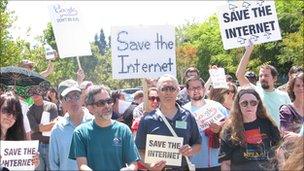Net neutrality rules get go ahead from US regulators
- Published

The issue has already been the subject of protests
US regulators have approved new rules meant to prohibit broadband companies from interfering with internet traffic.
The Federal Communications Commission (FCC) voted 3-2 on the principle known as net neutrality; a tenet that ensures all web traffic is treated equally.
The rules have been criticised for setting different standards for fixed line broadband and mobile operators.
Officials said the regulations are "the first time the commission has adopted enforceable rules" to govern the web.
The FCC's three Democrats voted to pass the regulations, while the agency's two Republicans opposed them, arguing that they were unnecessary.
Tuesday's vote is the culmination of five years of fighting over how best to ensure the free flow of information in all its forms over the internet.
The FCC vote also comes at a time when consumers are increasingly accessing the web via smart phones and turning to the internet to watch TV shows.
'Rules of the road'
The commission's ability to regulate the internet was thrown into doubt following an appeals court decision earlier this year that said the agency lacked the authority to stop cable firm ComCast from blocking bandwidth-hogging applications.
Many arguing for net neutrality say it is a fundamental freedom the web should guarantee
The FCC said the vote addressed "basic rules of the road to preserve the open internet as a platform for innovation, investment, competition and free expression".
That is a view backed by chairman Julius Genachowski.
"We're adopting a framework that will increase certainty for businesses, investors and entrepreneurs," Mr Genachowski said in remarks prior to the vote.
"We're taking an approach that will help foster a cycle of massive investment, innovation and consumer demand both at the edge and in the core of our broadband networks."
Michael Copps, a Democrat, said in a written statement ahead of the vote that rules represented "an important milestone in the ongoing struggle to safeguard the awesome opportunity-creating power of the open internet".
The regulations are expected to be challenged in court.
'Squandered'
A number of interested parties including internet providers, developers and companies like Google have said the rules could provide some regulatory certainty going forward. Many have acknowledged that the regulations could have been much worse.
The new rules prohibit telecommunications companies that provide high-speed internet service from blocking access by customers to any legal content, applications or service.
But, for the first time, there is now a policy that will allow for what has been termed "paid-prioritisation", where companies will be able to pay for a faster service.
The FCC regulations place tougher restrictions on wired services from cable and phone companies than on wireless carriers, which have more limited bandwidth.
The vote comes amid increases in the amount of smart phones and tablet devices that are being used to access the web and watch TV shows.
The rules allow mobile firms to block access to sites or applications that specifically compete with a carrier's voice or video services.
Supporters of net neutrality feel the new regulations should have gone further and have slammed them as "fake net neutrality".
"I think today is a tremendously important day in the fight to preserve a free and open internet," Aparna Sridhar of advocacy group the Free Press, told 91热爆 News.
"Chairman Genachowski has completely squandered a golden opportunity to make this vote meaningful. Until now we have had a certain amount of regulatory uncertainty, and the carriers have had an incentive to stay on their best behaviour.
Ms Sridhar added that the rules endorse "bad practices in the wireless space".
, Al Franken, US Senator for Minnesota, earlier called the FCC vote "the most important free speech issue of our time".
- Published1 December 2010
- Published22 December 2010
- Published30 September 2010
- Published15 September 2010
- Published17 November 2010
- Published2 September 2010